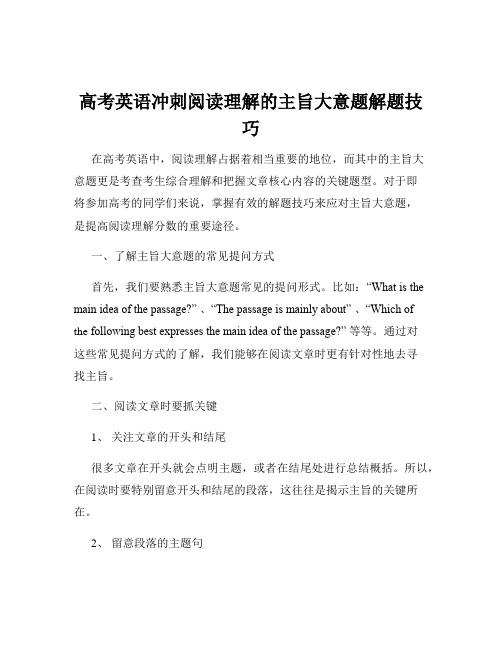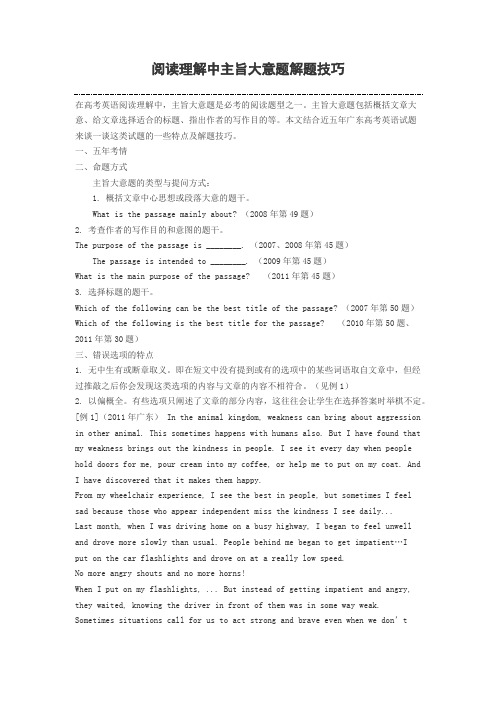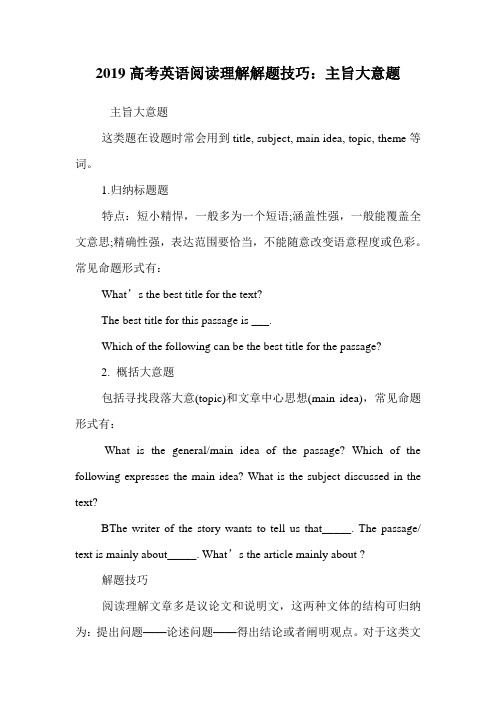高考英语主旨大意题答题技巧
高考英语冲刺阅读理解的主旨大意题解题技巧

高考英语冲刺阅读理解的主旨大意题解题技巧在高考英语中,阅读理解占据着相当重要的地位,而其中的主旨大意题更是考查考生综合理解和把握文章核心内容的关键题型。
对于即将参加高考的同学们来说,掌握有效的解题技巧来应对主旨大意题,是提高阅读理解分数的重要途径。
一、了解主旨大意题的常见提问方式首先,我们要熟悉主旨大意题常见的提问形式。
比如:“What is the main idea of the passage?” 、“The passage is mainly about” 、“Which ofthe following best expresses the main idea of the passage?” 等等。
通过对这些常见提问方式的了解,我们能够在阅读文章时更有针对性地去寻找主旨。
二、阅读文章时要抓关键1、关注文章的开头和结尾很多文章在开头就会点明主题,或者在结尾处进行总结概括。
所以,在阅读时要特别留意开头和结尾的段落,这往往是揭示主旨的关键所在。
2、留意段落的主题句通常,每个段落都会有一个主题句,它能够概括该段落的主要内容。
主题句可能出现在段首、段中或段尾。
如果能够准确找到段落的主题句,对于理解整篇文章的主旨会有很大帮助。
3、注意文中的转折词和总结词像“but”、“however”等转折词,以及“therefore”、“thus”等总结词后面的内容,往往包含着重要的信息,可能会指向文章的主旨。
三、排除干扰选项1、以偏概全的选项这类选项往往只涉及文章的某一部分内容,而不能涵盖整篇文章的主旨。
2、过于具体的细节选项虽然是文章中提到的内容,但只是具体的细节,不能代表文章的整体大意。
3、与文章内容无关的选项有些选项可能与文章的主题毫无关联,很容易被排除。
4、主观臆断的选项这类选项是根据自己的想法推测出来的,而非基于文章的内容。
四、归纳总结文章主旨在理解了文章的大致内容,并排除了干扰选项后,我们需要对文章的主旨进行归纳总结。
英语阅读理解主旨大意题解题技巧

英理解主旨大意的解技巧高考理解主旨大意的考旨在考学生一篇文章或一个段落的深次理解和把握其主旨大意的能力。
一般某一段或某一篇的主或目的。
目考的范是:根本点、文章、主或段落大意等。
它要求考生在理解全文的基上能好地运用概括、判断、、推理等思方法,文章行高度概括或,要求学生通快速取篇中心思想的能力,辨主要信息和次要信息的能力,以及要求学生要具有上下文的概括能力。
1、主旨大意干常的句形式1〕主旨句型Whatisthemainideaofthispassage?Whatdoesthepassagemainlytalkabout?Wecanconclude/learnfromthepassagethat⋯⋯2〕最正确型Thebesttitleforthispassageis⋯⋯3〕作者主旨意型Whatdoesthewriterwanttotellus?Whichcanexpressthepurposeofthewriteraccordingtothepassage?在高考阅读理解中,主旨大意题的考查占有十分重要的位置。
主题思想是文章的核心,能否抓住文章的主题思想,是考生阅读能力最主要的表达。
高考中阅读理解的测试,自然也以此作为检验考生阅读理解能力最重要的标准。
下面就这一题型给出一些思路、做题步骤及技巧:.划分文章结构。
英语的文章讲究使用主题段和主题句。
主题段通常在文章的开头或结尾,简要概括文章的中心思想。
段与段之间常用词语连接,承上启下,使文章行文连贯,逻辑严密。
为突出主题,作者可能采用不同的写作手法来组织文章,通过举例、比拟、类比等手法来透彻说明主题观点。
因此根据文章理顺文章的脉络,理解段落层次之间的关系,弄清作者的写作方法,理清全文结构安排,了解文章的重心,就能概括出文章的中心。
要准确地抓住文章的主题思想,就要十分留意文章的开头和结尾也就是文章的中心段落,要抓住文中具有概括性的信息,从上下文连贯的意思来理解全文,看作者主要谈的是什么,透过文字表达的过程来归纳主题,再从选择项中找出最符合表达主题思想的选项。
英语阅读理解主旨大意解题技巧

英语阅读理解主旨大意解题技巧英语阅读理解主旨大意解题技巧主旨大意题是高考阅读理解的主要题型之一,旨在考查考生对锻炼大意或者文章中心思想的把握和归纳能力。
此类题数量较大,在15个题中约占3-4个。
下面就跟着店铺一起来详细了解一下主旨大意题的解题技巧吧!◆主旨大意题的分类⑴从考查对象上划分,主旨大意题可分为两种①篇章主旨:针对全文的主题进行提问。
主题句出现在首段的居多,其次是末段或为几段主题的综②段落主旨:针对某一段或几段的`主题提问。
主题句可能是段落的首句、末句,也可能需要从上下文中寻找或总结。
⑵从考查内容上划分,主旨大意题可分为三种①主题类(内容),考查文章或段落的主旨大意;②目的类,考查文章或段落的写作目的;③标题类,要求考生选出文章的最佳标题。
◆设问特点:1. 考查全文主旨或段落大意。
2. 正确选项概况范围大小恰当,主旨判断准确。
3. 错误选项的特点常常是太大、太窄或者偏离主题,主观臆断。
4. 常以main idea, best idea, subject, mainly discuss 等词提问。
◆常考问题:1). 中心思想类The main point /idea of the passage is…The passage is mai nly about…The passage mainly discusses…The last but one paragraph is chiefly concerned with…?Which of the following statements best expresses the main idea of the passage?2).标题类Which of the following is the best title of the passage?The best title for the passage would be …3).目的类The author’s main purpose in writing the passage is to …The passage is meant to ….In writing this passage, the author mainly intends to…【技巧点拨】1. 寻找主题句:抓住段落或文章主题的捷径之一就是在段落或文章中寻找主题句。
英语阅读理解中主旨大意题的答题技巧

英语阅读理解中主旨大意题的答题技巧一、考查方向这种综合概括类题目的一般范闱是:根本论点、文章标题、主题和段落大意,主要是测试考生阅读理解的根本能力,考查学生在语言水平上对文章的整体把握:能否分辨主题与细节:能否具有综合、概括、归纳和分析问题的能力。
这类题目一般有以下几种提问方式:这类题目一般有以下几种提问方式:(―)中心思想类1.The main idea / general idea of the passage is。
2.The text is mainly about。
3.This passage mainly tells us。
4.What is the topic of the text?5.What does the first / second / last paragraph discuss?6.The passage (The third paragraph) deals with。
7.Which of the following best summarizes the passage?(二)标题类1.The best title / headline for the passage would be。
2.Which of the following would be the best title for the passage?3.What is the best title for the passage?(三)写作意图类1.What is the purpose of the passage?2.The passage is trying to。
3.The author writes this passage in order to。
4.Tlie purpose of the passage is to。
5.The passage is written for。
二、中心思想与标题之间的差异A title is an identifying name given to a book, film, play, composition or other work。
阅读理解中主旨大意题解题技巧

在高考英语阅读理解中,主旨大意题是必考的阅读题型之一。
主旨大意题包括概括文章大意、给文章选择适合的标题、指出作者的写作目的等。
本文结合近五年广东高考英语试题来谈一谈这类试题的一些特点及解题技巧。
一、五年考情二、命题方式主旨大意题的类型与提问方式:1. 概括文章中心思想或段落大意的题干。
What is the passage mainly about? (2008年第49题)2. 考查作者的写作目的和意图的题干。
The purpose of the passage is ________. (2007、2008年第45题)The passage is intended to ________. (2009年第45题)What is the main purpose of the passage? (2011年第45题)3. 选择标题的题干。
Which of the following can be the best title of the passage? (2007年第50题)Which of the following is the best title for the passage? (2010年第50题、2011年第30题)三、错误选项的特点1. 无中生有或断章取义。
即在短文中没有提到或有的选项中的某些词语取自文章中,但经过推敲之后你会发现这类选项的内容与文章的内容不相符合。
(见例1)2. 以偏概全。
有些选项只阐述了文章的部分内容,这往往会让学生在选择答案时举棋不定。
[例1](2011年广东) In the animal kingdom, weakness can bring about aggression in other animal. This sometimes happens with humans also. But I have found that my weakness brings out the kindness in people. I see it every day when people hold doors for me, pour cream into my coffee, or help me to put on my coat. And I have discovered that it makes them happy.From my wheelchair experience, I see the best in people, but sometimes I feel sad because those who appear independent miss the kindness I see daily...Last month, when I was driving home on a busy highway, I began to feel unwell and drove more slowly than usual. People behind me began to get impatient (I)put on the car flashlights and drove on at a really low speed.No more angry shouts and no more horns!When I put on my flashlights, ... But instead of getting impatient and angry, they waited, knowing the driver in front of them was in some way weak. Sometimes situations call for us to act strong and brave even when we don’tfeel that way. But those are few and far between. More often, it would bebetter if we don’t pretend we feel strong when we feel weak or pretend that we are brave when we are scared.30. Which of the following is the best title for the passage?A. A Wheelchair ExperienceB. Weakness and KindnessC. Weakness and StrengthD. A Driving Experience选项A和C是似是而非。
高考英语阅读理解解题技巧:主旨大意题

2019高考英语阅读理解解题技巧:主旨大意题主旨大意题这类题在设题时常会用到title, subject, main idea, topic, theme等词。
1.归纳标题题特点:短小精悍,一般多为一个短语;涵盖性强,一般能覆盖全文意思;精确性强,表达范围要恰当,不能随意改变语意程度或色彩。
常见命题形式有:What’s the best title for the text?The best title for this passage is ___.Which of the following can be the best title for the passage?2. 概括大意题包括寻找段落大意(topic)和文章中心思想(main idea),常见命题形式有:What is the general/main idea of the passage? Which of the following expresses the main idea? What is the subject discussed in the text?BThe writer of the story wants to tell us that_____. The passage/ text is mainly about_____. What’s the article mainly about ?解题技巧阅读理解文章多是议论文和说明文,这两种文体的结构可归纳为:提出问题——论述问题——得出结论或者阐明观点。
对于这类文章,抓主题句是快速掌握文章大意的主要方法。
主题句一般出现在文章的开头或结尾。
主题句具有简洁性、概括性的特点。
主题句在文章中的位置主要有以下几种情况。
位于段首:一般而言,以演绎法撰写的文章,主题句往往在文章的开头,即先点出主题,然后围绕这一主题作具体的陈述。
判断第一句是否为主题句,可具体分析段落的首句与第二,三句的关系;如果从第二句就开始对第一句进行说明,论述或描述,那第一句就是主题句。
高考英语阅读主旨大意题的解题技巧

高考英语阅读:主旨大意题的解题技巧一、主旨大意题的命题形式主旨大意题旨在考查考生把握全文主题和理解中心思想的能力,亦即考查考生的归纳概括能力。
这类试题包括要求考生选出短文的标题(title, headline)、短文或段落的主题(subject)、中心思想(main idea)、作者的写作目的(purpose或为传递信息、或为愉悦读者、或为阐述某一道理)等。
这类题的设问方式主要有:(1)The subject of the passage/paragraph is ______.(2)The main idea of the passage/paragraph is ______.(3)The text is mainly about ______.(4)The passage mainly centers on ______.(5)The passage mainly tells about ______.(6)What is the subject discussed in the text?(7)What is the main idea of this passage?(8)What is the passage mainly about?(9)What does the second paragraph mainly discuss?(10)What is the main point the writer is trying to make in the last paragraph?(11)Which of the following is the best title for the passage?(12)Which title best gives the idea of the passage?(13)What would be the best title for the text?(14)What might be the most suitable title for the passage?(15)The best headlines for this newspaper article would be______(16)The main purpose of announcing the above events is to give information about ______.(17)The writer's purpose in writing this story is ______.(18)What is the author's main purpose?(19)What does the writer really want to tell us in this passage?(20)The writer wrote the story in order to______.(21)What is the advice given in the text / passage / article?二、寻找主题句的方法正确的解答这类题目的关键是准确地找出文章的主题句。
英语阅读理解解题方法

英语阅读理解解题方法英语阅读理解答题技巧一、紧扣主旨大意高考英语阅读理解的主旨大意题主要是考查考生在理解全文的基础上运用概括、判断、归纳、推理等逻辑思维的方法对文章进行高度的概括或总结的能力。
常见的设问方式有以下三类:●标题类:What’s the best title/headline for the passage?●大意类:The text is mainly about__.The topic/subject discussed in the passage is _ .From the passage,we can conclude that _ .●作者意图类:What’s the writer’s purpose in writing the passage?针对主旨大意类型的题,学生可以掌握以下解题策略:一、把握文章逻辑结构,快速找出主题阅读理解文章的主要逻辑结构:1、时间顺序。
按时间先后顺序说明某一事件、某一理论的发展过程,属于这种结构的文章主题通常在首段或末段。
2、“总说-分述”结构。
首段做总的说明,其他段落分别说明或具体论述首段的观点,属于这种结构的文章主题在首段。
最典型的是新闻报道类文章,此类体裁的文章在近年高考阅读中逐渐增多。
一般这类文章都有固定格式:城市名称(新闻社)—新闻内容。
掌握一些国际知名新闻社的英文名称是必要的,路透社Reuters,美联社Associated Press,法新社Agence France Presse。
3、“分述-总说”结构。
前面几段分别说明,末段总结。
属于这种结构的文章主题在末段。
二、寻找主题句,确定文章中心思想不是所有的文章都有主题句,对于大部分有主题句的文章来说,主题句表达了文章的中心思想,找到了主题句,也就抓住了文章的主旨大意。
主题句呈现的形式有:1、在文首。
文章开门见山,提出主题,随后摆事实、讲道理来解释、支撑和发展主题句所表达的主题思想。
- 1、下载文档前请自行甄别文档内容的完整性,平台不提供额外的编辑、内容补充、找答案等附加服务。
- 2、"仅部分预览"的文档,不可在线预览部分如存在完整性等问题,可反馈申请退款(可完整预览的文档不适用该条件!)。
- 3、如文档侵犯您的权益,请联系客服反馈,我们会尽快为您处理(人工客服工作时间:9:00-18:30)。
高考英语主旨大意题答题技巧我们阅读一篇文章,首先是要了解其大意,明确其主旨。
因此,主旨大意题是常考题。
主旨大意题包括:主要内容(main idea, mainly about)型、文章标题(title)型、写作目的(purpose)型。
一、主要内容型[技巧点拨]弄清文章的大意,关键是找到主题句。
主题句的位置:主题句通常在文首、文末或首尾呼应,有时也在文中,或没有主题句,需根据文章所述内容进行归纳。
各段的主题句也常在该段的首句或尾句。
议论文和说明文一般有主题句,但记叙文通常没有主题句,需要归纳。
找主题句的方法:用浏览法(skimming),即快速阅读文首、文尾,或每段的首句和尾句等,搜索主题线索和主题信息。
找主题句的四个小窍门:1.段落中出现表转折的词语(如however, but, in fact, actually, while, on the contrary, in contrast等)时,其后的句子很可能是主题句。
2.首段出现疑问句时,对该问题的回答很可能就是主题句。
3.作者有意识地反复强调的观点,通常是主旨;反复出现的词语,一般为体现文章主旨的关键词。
4.表示总结或结论的话常有therefore,thus, in short,conclude, conclusion 等。
经典例题1. That’s when Jack arrived on the scene. He was different from any other guy I’d dated. He could sit for hours on the piano bench with my mother, discussing some composers. My brother Rick loudly announced that Jack wasn’t a turkey like the other guys I’d brought home. Jack passed my family’s test.But what about Dad’s?What is the main idea of Paragraph 2?A. Jack got the family’s approval except Dad’s.B. Jack was different from any other boy.C. Jack was getting on well with Mother.D. Jack knew a lot about piano.答案:A解析:通过第二段的内容可知Jack赢得了作者全家人的欣赏,但由于作者的父亲已去世,作者不知道Jack在父亲那儿是否也能通过,故A正确。
2. Have you ever been to the world’s smallest bookstore?The world’s smallest bookstore, whose official name is just these three words, sits quietly about 100 miles northeast of Toronto.What’s the passage mainly about?A. The world’s smallest bookstore.B. A strange way of selling books.C. The popular books nowadays.D. The popular bookstores in the world答案:A解析:文章第一段用一个问句引出了本文的主题:你去过世界上最小的图书馆吗?后文对该图书馆做了详细的描述,所以本文的主题就是A项。
3. It’s generally believed that people act the way they do because oftheir personalities and attitudes. They recycle their garbage because they care about the environment. They pay S5 for a caramel brul6e latte because they like expensive coffee drinks.It’s undeniable that behavior comes from our inner dispositions (性情),but in many instances we also draw inferences about who we are, as suggested by the social psychologist Daryl Bern, by observing our own behavior. We can be strangers to ourselves. If we knew our own minds,why would we need to guess what our preferences are from our behavior? If our minds were an open book, we would know exactly how much we care about the environment or like lattes. Actually,we often need to look to our behavior to figure out who we are.Moreover, we don’t just use our behavior to learn about our particular types of character. We infer characters that weren’t there before. Our behavior is often shaped by little pressures around us, which we fail to recognize. Maybe we recycle because our wives and neighbors would disapprove if we didn't. Maybe we buy lattes in order to impress the people around us. We should not mistakenly believe that we always behave as a result of some inner disposition.Whatever pressures there can be or inferences one can make, people become what they do,though it may not be in compliance (符合)with their true desires. Therefore, we should all bear in mind Kurt Vonnegufs advice:“We are what we pretend to be, so we must be careful about what we pretend to be. ’’What does the author mainly discuss in the passage?A. Personalities and attitudes.B. Preferences and habits.C. Behavior and personalities.D. Attitudes and preferences.答案:C解析:本文的第一段提出普遍观点“行为来自个性和态度”,第二段含but的首句才是本文要提出的观点,“行为来自个性这是不可否认的,但在许多情况下,我们会作出推论:我们是谁”,第三段和第四段说“我们的行为还来自于我们周围人的压力,可能并不是我们真实的愿望”即“行为不一定来自个性”,因此,全文是说“行为与个性之间的关系”。
另外,文中不断复现的词即为本文的关键词,是讨论的中心。
behavior (行为)共出现了8次(act一次, behavior六次, behave一次),personalities(个性)以近义的形式复现了6次(inner dispositions, character, characters, inner disposition, true desires),因此,本文主要讨论的是behavior和personalities,故选C。
二.文章标题型文章标题就是对文章的主要意思的概括,因此,解答这类题的方法与解答主旨要义题的方法基本相同,都是寻找主题句,或归纳主要内容。
但主要内容题(main idea, mainly about)的选项多用句子的形式,而标题多用短语(特别是名词短语)的形式,且具有以下3个特点:(1)概括性:准确而又简短。
(2)针对性:内容范围相符,“帽子”不大不小。
(3)醒目性:新颖奇特,能引发读者急迫的阅读欲望。
推敲选项正误的4个小窍门:1.正确选项一般含有抽象名词或概括性词语,不出现细节信息,不含过分肯定或绝对意义的词。
2.概括全面、范围一致、说明道理的选项一般是正确答案。
3.四个选项中,内容完全相反的两个选项中往往有一个是正确答案。
4.干扰项特点:(1) 概括范围太窄,只含局部信息或某个细节;(2) 概括范围太宽,所表达的内容超出或多于文章阐述的内容;(3)无关信息:即文章中未提到、或找不到语言依据的信息。
经典例题1. It’s not easy, even desperate.“We have many children left to place: 40 out of 75,” said Straub, who works for a Paris-based foreign exchange programme called LEC.When exchange programme started 50 years ago, family life was more accommodating. For one thing, more mothers stayed home. But now, increasing numbers of women work outside the home. Exchange-student programs have struggled in recent years to sign up host families for the 30,000 teenagers who annually come from abroad to spend their academic year in the United States, as well as the thousands more who participate in summer programmes.Which of the following is the best title of this passage?A. Exchange Students Keep Old People YoungB. Idea of Hosting Students Is DifferentC. Foreign-exchange Program Is Going OnD. US Struggles to Find Host Families答案:D解析:根据第二段It’s not easy, even desperate.及下文描述的未来在美国的交换生申请寄宿家庭越来越困难及其原因和相应对策,可知 D项可以概括文章的内容,适合作文章标题。
